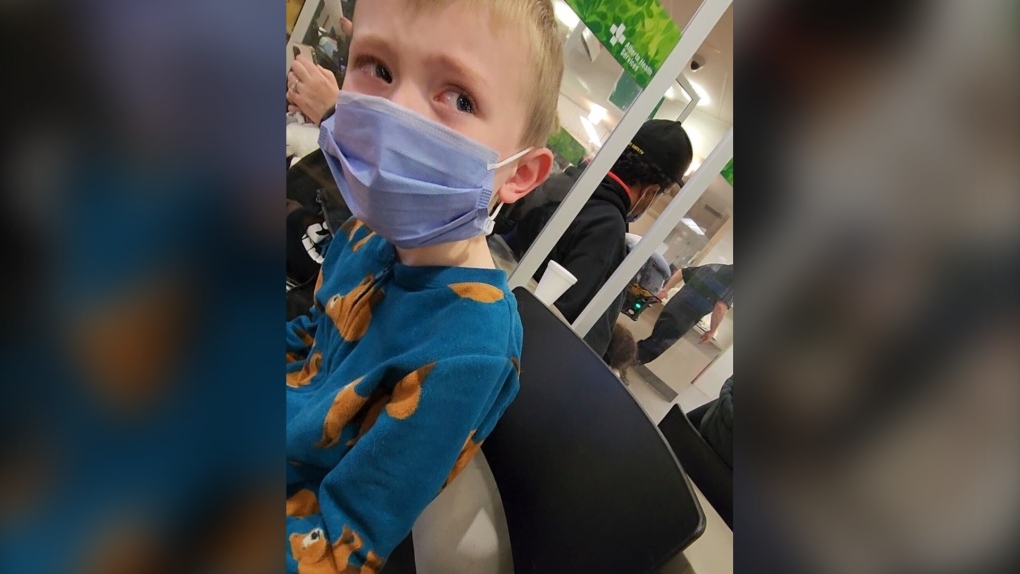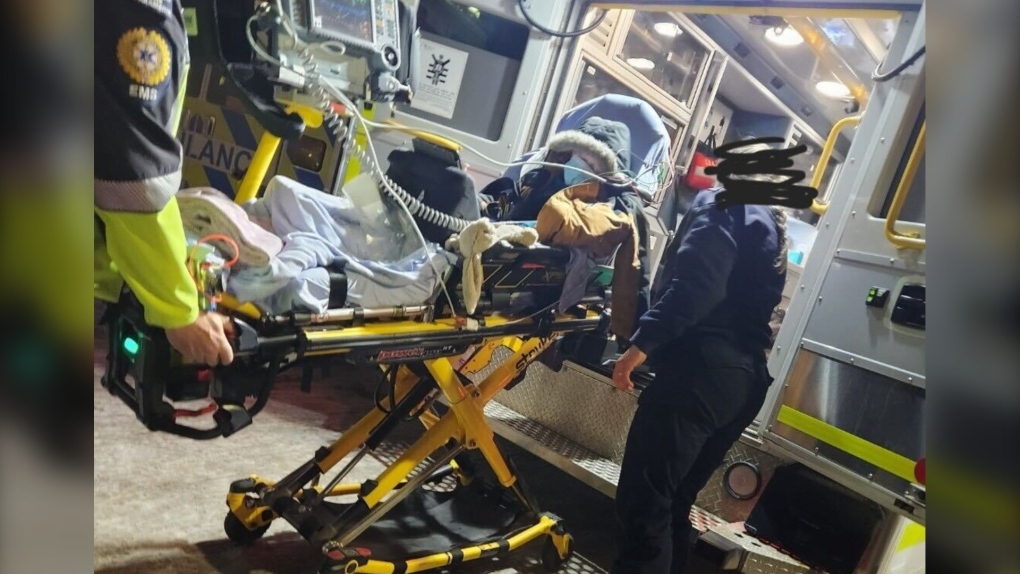Alberta pediatric hospitals struggling to keep up as Stollery, ACH at or near capacity: AHS
Alberta pediatric intensive care units are "close to 100 per cent" of their normal capacity and preparations are being made should there need to be surge spaces, Alberta Health Services says.
Hospitals are experiencing an early start to the respiratory illness season and a "steep rise" in emergency room visits, said Kristi Bland, AHS spokesperson.
"Like those in other provinces, Alberta's pediatric hospitals are extremely busy following a surge in children with respiratory illnesses — including influenza, COVID and RSV — coupled with pressure caused by ongoing staffing challenges," Bland added in a statement.
"High patient volumes are causing long wait times in our pediatric emergency departments," Bland said. "We acknowledge that in some instances, patients are waiting longer than they should."
"Inpatient units at both pediatric sites in Alberta are either at or over 100 per cent of their normal beds and we are adding staff to increase beyond their normal capacity as at any peak time."
- Lines out the door, 17-hour waits: Alberta Children's Hospital crushed by respiratory infections
- Alberta's influenza hospitalizations almost triple as flu season intensifies
Bland said the Alberta Children's Hospital (ACH) is seeing more than 300 visits a day recently, with about 180 to 220 visits being the normal number before the recent surge in visits.
At the ACH in Calgary, Bland says a "site command post" has been opened to support frontline teams, a short stay unit on weekends is being prepared and other areas of the hospital are being looked at to provide care and assessment for inpatients and emergency department visits.
In Edmonton, Bland said the Stollery Children's Hospital is utilizing clinic space to support lower acuity kids, with physician coverage being augmented by pediatricians. Additional nursing staff have also been added.
Since August, 146 people had been hospitalized with influenza and 13 needed intensive care, Bland said. About 32 per cent of those hospitalizations were children under nine years of age.
AHS encourages parents contact Health Link at 811 and consult online resources available on its website before going to an emergency.
"Many people end up in the emergency department because they don't know where else to go," Bland said.
"If you need urgent care, then you should visit an emergency department as soon as possible.
"However, if your need is not urgent, an emergency department may not be the right place for you."
- Online learning, event cancellations considered as Edmonton school absences total 21K
- 'These situations happen': LaGrange leaving school illness spike to administrators, AHS
'THE HOSPITAL COULD JUST NOT KEEP UP'
Last week, Rayanne Boychuk had to call an ambulance for her six-year-old son, Liam, who was having a severe asthma attack.
Paramedics took him to the Stollery Children's Hospital in Edmonton where she was then informed the wait time for Liam to receive help would be 16 hours.
"The room was full of other kids that were very injured or very ill and they were just left crying for hours," Boychuk recalled to CTV News Edmonton.
 Rayanne Boychuk had to take her six-year-old son Liam to the emergency last week and was faced with a 16-hour wait for care at the Stollery Children's Hospital in Edmonton (Supplied).
Rayanne Boychuk had to take her six-year-old son Liam to the emergency last week and was faced with a 16-hour wait for care at the Stollery Children's Hospital in Edmonton (Supplied).
At that point, she wasn't simply worried about her own son, but all the other sick children waiting for attention.
"The Stollery was doing the best they could," she added, "but the amount of patients that they had was just nothing they could even keep up with."
"The hospital could just not keep up."
 Rayanne Boychuk had to take her six-year-old son Liam to the emergency last week and was faced with a 16-hour wait for care at the Stollery Children's Hospital in Edmonton (Supplied).
Rayanne Boychuk had to take her six-year-old son Liam to the emergency last week and was faced with a 16-hour wait for care at the Stollery Children's Hospital in Edmonton (Supplied).
After waiting several hours, Boychuk ended up taking her son to the hospital in Barrhead — about 120 kilometres northeast of Edmonton — where Liam was seen immediately.
Hospital staff informed her that Liam's asthma had been triggered by a chest infection.
Her next challenge was to find a pharmacy that had amoxicillin in stock, a common antibiotic prescribed to children. She said Liam eventually received the last dose the Edmonton area pharmacy had.
"So like, what are kids (and parents) going to do now?" she asked. "All these kids are going to the hospitals, but what if there's no treatment for them either?"
- Canada-wide amoxicillin shortage has pharmacists looking for alternatives
- Kids' Advil packs on sale for nearly $300 on Amazon as pressure mounts at pediatric hospitals
'FRAGILE STATE'
Dr. James Talbot, former Alberta chief medical officer of health, said the "multi-demic" of respiratory syncytial virus (RSV), COVID-19 and influenza is adding to an already stretched health care system.
"The health care system is still in a pretty fragile state," Talbot told CTV News Edmonton.
He said nurse colleagues have told him many still feel overwhelmed from the past two-and-a-half years of dealing with COVID-19.
"So anything that parents can do, schools can do, the community can do, the government can do to keep the pressure off the hospitals would be very much appreciated by the people who, at the beginning of the pandemic, were the ones who put their lives on the line to protect us," Talbot said.
On Monday, Premier Danielle Smith said "significant reforms" to AHS were going to be announced "later this week" to make "more efficient emergency rooms."
"I think we still have a few difficult months to get through respiratory virus season," she acknowledged, adding that securing supply of children's cold and flu medication was a top priority.
 Danielle Smith was asked about school illnesses and health leadership at an unrelated announcement on Monday, Nov. 14, 2022 (CTV News Edmonton/John Hanson).
Danielle Smith was asked about school illnesses and health leadership at an unrelated announcement on Monday, Nov. 14, 2022 (CTV News Edmonton/John Hanson).
"That's really important because if parents don't have the drugs that they need to be able to treat fever at home, then they're going to hospital waiting rooms, and the hospital waits are unacceptably long," Smith said.
- Health Canada says it has secured more foreign supply of children's pain medication
- Pharmacists adapting to meet demand for children's cold and flu medications
She said RSV is one of the most common one that children are exposed to.
"What we are experiencing is because we had such draconian lockdowns over the last three years, there's just a large number of kids who didn't get that exposure," the premier said.
"And so now we have a surge in those cases and it's compounded by the fact that we still have not seen an increase in surge capacity at our hospitals. That's a failure in Alberta Health Services management."
With files from CTV News Edmonton's Alison MacKinnon and Steven Dyer
CTVNews.ca Top Stories

Donald Trump says he urged Wayne Gretzky to run for prime minister in Christmas visit
U.S. president-elect Donald Trump says he told Canadian hockey legend Wayne Gretzky he should run for prime minister during a Christmas visit but adds that the athlete declined interest in politics.
Ho! Ho! HOLY that's cold! Montreal boogie boarder in Santa suit hits St. Lawrence waters
Montreal body surfer Carlos Hebert-Plante boogie boards all year round, and donned a Santa Claus suit to hit the water on Christmas Day in -14 degree Celsius weather.
Historical mysteries solved by science in 2024
This year, scientists were able to pull back the curtain on mysteries surrounding figures across history, both known and unknown, to reveal more about their unique stories.
Montreal man dead after boat explodes in Fort Lauderdale
A Montreal man is dead and several others are injured after a boat exploded in Fort Lauderdale, Florida.
Mother-daughter duo pursuing university dreams at the same time
For one University of Windsor student, what is typically a chance to gain independence from her parents has become a chance to spend more time with her biggest cheerleader — her mom.
Azerbaijani airliner crashes in Kazakhstan, killing 38 with 29 survivors, officials say
An Azerbaijani airliner with 67 people onboard crashed Wednesday near the Kazakhstani city of Aktau, killing 38 people and leaving 29 survivors, a Kazakh official said.
King Charles III focuses Christmas message on healthcare workers in year marked by royal illnesses
King Charles III used his annual Christmas message Wednesday to hail the selflessness of those who have cared for him and the Princess of Wales this year, after both were diagnosed with cancer.
Alberta premier hopes for health reform payoff in 2025, regrets deferring tax cut
"It may have been better for Albertans if we'd implemented and then found a way to be able to pay for it."
NFL's Netflix debut on Christmas Day kicked off without a glitch
Mariah Carey opened Wednesday’s doubleheader with a taped performance of “All I Want for Christmas is You” before Patrick Mahomes, Travis Kelce and the two-time defending Super Bowl champion Kansas City Chiefs faced off against Russell Wilson, T.J. Watt and the Pittsburgh Steelers.































